by lauenc | Oct 7, 2024
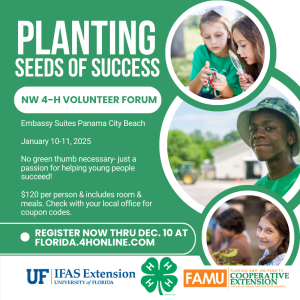 Dates: January 10-11, 2025
Dates: January 10-11, 2025
Location: Panama City Beach, FL
Are you excited about helping young people grow? Do you want to become a stronger leader and connect with others who share your passion? Then save the date for the Northwest 4-H Volunteer Forum in Panama City Beach! We’re looking forward to a weekend filled with learning, fun, and connection. This forum is a great chance for 4-H volunteers to gain new skills, share ideas, and make an even bigger impact on the youth we serve.
Volunteers are the heart of 4-H. You play a vital role in mentoring young people and helping them grow in projects like agriculture, science, health, and citizenship. Without your time and dedication, 4-H wouldn’t be able to fulfill its mission to empower and guide the next generation.
One of the best parts of attending the forum is the chance to network with fellow volunteers. Connecting with others who share your passion for 4-H opens the door to collaboration and learning from each other’s experiences. By building communities of practice, we strengthen our local programs and create lasting partnerships that help us serve youth more effectively. These connections can lead to new ideas, shared resources, and ongoing support from others who understand the challenges and rewards of volunteering.
At the forum, you’ll have the chance to attend workshops designed to strengthen leadership, build new programs, and provide helpful tips for mentoring youth. These sessions will be led by experienced 4-H Agents and volunteers who can’t wait to share their insights. You’ll leave with fresh ideas and skills to take back to your 4-H community, helping to make an even bigger difference.
Register today to be part of this exciting opportunity! Not only will you grow as a leader, but you’ll also contribute to the success of 4-H for years to come. Let’s work together to inspire the next generation of leaders and problem-solvers. Don’t miss out—come grow, connect, and lead with us!
Feel free to share this invitation with other volunteers or anyone interested in supporting 4-H. Let’s grow together!
Register in 4Honline now through December 10th.
by Valerie Mendez Stansly | Nov 17, 2023
Agriculture plays an important role in our society, yet a noticeable gap in understanding and engaging with this sector is evident among youth. Often, this disconnect stems from misconceptions about agriculture and the vast career opportunities it offers. Addressing these challenges requires long-term educational efforts that provide youth with hands-on experiences in the form of field excursions to increase interest and participation in Agriscience topics. The Ag Adventures program, an annual venture between UF/IFAS North Florida Research and Education Center (NFREC) and Florida 4-H, was created in response to this need. It aims to immerse students in the diverse and rich world of agriculture through experiential learning.
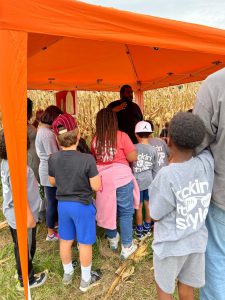
Ag Adventures connects youth from urban and rural areas to a large-scale farming research center, offering a firsthand look at agriscience topics in action.
Program Overview
For years, Ag Adventures has been actively engaging 4th and 5th graders from counties across the Panhandle. This program introduces students to several key subfields in agriculture, with an emphasis on sustainability:
- Soil Science: Students learn about the critical role of soil in natural ecosystems and agriculture. Hands-on experiences, such as exploring a soil pit, help youth gain a deeper understanding of soil science topics.
- Agricultural Technology: Students explore the latest innovations in precision agriculture, including drones and sensor technology, and their role in promoting sustainability and economic growth.
- Entomology: Focusing on the vital role of pollinators, students learn about the impact of insects on the ecosystem and our food supply. Field activities, like insect collecting, offer practical understanding of the importance of these animals and the need to protect them.
- Agronomy: By learning about crops such as corn, cotton, and peanuts, students gain insights into the economic and historical significance of agriculture in North Florida. Through this section, researchers and agents are able to showcases the diversity and complexity of plant science in a tangible way.
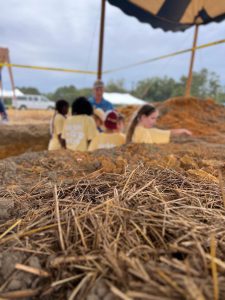
Students explore a soil pit, uncovering the hidden wonders of soil science and gaining hands-on insight into soil formation in our region.
Benefits of Field Excursions
Engagement in programs like Ag Adventures offers a multitude of benefits, equipping students with valuable insights and experiences that go beyond the traditional classroom. Such field excursions are important for:
- Strengthening STEM Appreciation: By contextualizing STEM concepts within the framework of agriculture, Ag Adventures bridges the gap between classroom learning and its practical applications. This approach not only enriches students’ understanding of STEM but can also spark their curiosity about agriscience.
- Facilitating Career Exploration: Ag Adventures provides a platform for youth to explore various careers in STEM. Through interactive experiences and exposure to academic pathways, the program demystifies agriculture, making it more accessible and relatable. This engagement broadens their career horizons and helps them envision a future where they can apply their learning in diverse ways.
- Bridging the Urban-Rural Divide: Ag Adventures offers youth from all backgrounds a chance to experience large-scale farming firsthand. By connecting youth directly with the source of their food, the program fosters a deeper appreciation for agricultural contributions and the interdependence between urban and rural communities.
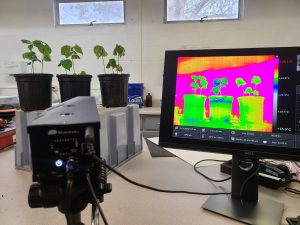
Ag Adventures enables young learners to engage with faculty members and discover cutting-edge agricultural research. For example, NFREC researchers demonstrate the use of thermal imaging technology to detect drought stress in crops, showcasing practical applications of science in farming.
Conclusion
The Ag Adventures program enhances the educational experience of 4th and 5th graders by merging classroom learning with real-world agricultural practices. This initiative by UF/IFAS Extension deepens their appreciation for STEM, opens new avenues for career exploration, and introduces them to the unique aspects of rural life and agriculture. We hope students develop a more comprehensive understanding of the world, laying the foundation for them to become informed and engaged members of society.
This program occurs annually in the fall. If you are interested in your school participating, please contact your local UF/IFAS Extension office.
References:
Behrendt, M., & Franklin, T. (2014). A review of research on school field trips and their value in education. International Journal of Environmental and Science Education, 9(3), 235-245.
Jean-Philippe, S., Richards, J., Gwinn, K., & Beyl, C. (2017). Urban youth perceptions of agriculture. Journal of Youth Development, 12(3). https://doi.org/10.5195/jyd.2017.497
by Marcus Boston Jr. | Apr 13, 2023
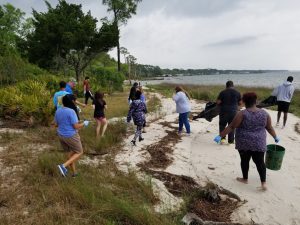 Life skills for youth are defined as a set of abilities and competencies that enable young people to successfully navigate their daily lives and achieve their goals. These skills are essential for personal and professional development and help “prepare youth to be responsible citizens and productive members of the workforce.” Florida 4-H provides many opportunities for young people to obtain life skills through project work, community and afterschool clubs, workshops, and leadership programs.
Life skills for youth are defined as a set of abilities and competencies that enable young people to successfully navigate their daily lives and achieve their goals. These skills are essential for personal and professional development and help “prepare youth to be responsible citizens and productive members of the workforce.” Florida 4-H provides many opportunities for young people to obtain life skills through project work, community and afterschool clubs, workshops, and leadership programs.
As a state-wide organization, Florida 4-H prioritizes the development of communication, higher-order thinking, and appreciation of differences. These three life skills are infused throughout our educational activities and programs because they are essential workforce skills. Below are a few examples of local programs that focus on helping youth develop life skills:
- Communication: 4-H provides opportunities for youth to develop their communication skills through the Florida 4-H Public Speaking Contest, demonstrations, and presentations at County/District and 4-H University. These activities help youth learn how to articulate their ideas clearly and confidently.
- Higher Order Thinking: this includes both decision-making and problem-solving.
- Decision-Making: 4-H offers various programs, such as judging contests at fairs, 4-H event planning committees (district/state council), and club activities that help youth develop their decision-making skills. These activities help youth learn how to make informed decisions and evaluate the outcomes of their choices.
- Problem-Solving: 4-H offers various programs, such as STEM projects and engineering challenges, that help youth develop problem-solving skills. These activities encourage youth to think creatively and find innovative solutions to complex problems.
- Appreciation of Differences– 4-H helps youth learn how to respect and communicate with people who might be different from themselves. Many of our programs offer opportunities for youth to meet new people and explore different cultures. We also help youth learn how to address conflict in a positive way through civil discourse. Older youth can participate in exchange programs with 4-Hers from other states and countries (4-H is in all 50 states and 32 other countries!).
- Teamwork: Through 4-H club projects, counselor training, and community service activities, youth learn how to work collaboratively with others towards a common goal, which helps them develop important teamwork skills.
- Responsibility: 4-H club projects and community service activities encourage youth to take responsibility for their actions and to learn the importance of following through on commitments.
- Leadership Development: 4-H offers various programs, such as officer training, public speaking, county/district councils, and community service projects, that help youth develop their leadership skills.
- Self-Confidence: 4-H programs provide a safe and supportive environment where youth can build their self-confidence through public speaking, leadership roles, and community service activities.
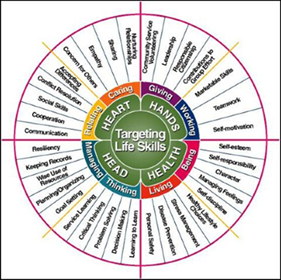
- Service Learning: Through 4-H club work, obtaining a Florida 4-H Community Pride Grant, and active membership on county/district councils, youth members take part in projects and experiences that help them how to become active participants in the communities and apply their experiences to real-life situations.
These are not the only life skills youth in Florida can learn and practice through 4-H- but they are part of almost every program we offer. These are examples of the priority life skills that Florida 4-H promotes among youth, with a focus on cognitive development, interpersonal skills, leadership, civic engagement, and practical skills. Florida 4-H aims to provide a comprehensive youth development program that equips young people with the skills they need to succeed in their personal lives, careers, and communities. Active involvement in 4-H will help members to connect life skills obtained through their 4-H involvement to real-life experiences. For more information on these youth leadership opportunities please contact your local 4-H office.
If you would like to help Florida 4-H teach life skills, or get your child involved in our program, reach out to your local UF/IFAS County Extension Office. There is an office in every county in Florida. Spring is a great time to get involved, because 4-H offers several summer programs for youth to develop life skills!
References:
Marilyn N. Norman and Joy C. Jordan.2018.Targeting Life Skills. EDIS document #4HSFS101.9
Hendricks, P.(1988). Developing Youth Curriculum Using The targeting Life Skills Model
Michigan State Extension. 2016. 4-H Head Life Skill Sheets.(4-H1679)
by Marie Arick | Feb 18, 2022

Mill Pond, Marianna, Fl. Photo credit Marie Arick
Grab your favorite soft cotton sweatshirt, jeans and those nice leather sneakers or boots … these all require agriculture! Kayaking in your favorite spring? Springs are considered a part of agriculture, labeled as a natural resource and are managed by the Florida Department of Environmental Protection.
Agriculture touches our lives daily. It would be quite impossible to navigate our world without the assistance of agriculture. Timber farms produce the lumber to build homes and make paper, cotton is used not only for clothing, but also in the creation of our paper monies. And we have not even discussed the foods we eat, and numerous other products created utilizing agricultural products.
Agricultural insight into the production and management of agricultural resources is why we in Extension promote and teach Ag Literacy. It is this basic knowledge that celebrates those who work hard daily to not only produce items to be consumed, but also manage those agricultural resources not only on the farm, but also our forests and waterways. This management can even rely on public policies for protection of these resources to ensure proper usage for generations to come.
Still not convinced? Did you wash your hair this morning and brush your teeth? Thank a farmer. Agricultural and the related industries contributed more than $1.1 trillion to the gross domestic product of the United States in 2019 and also provided 19.7 million jobs in 2020 per the U.S. Department of Agriculture. That is a small insight into how much agriculture impacts your life every day.
Everyone is dependent on agriculture in numerous forms each day. Celebrating Ag Literacy Day is a great way to expand your agricultural insight and awareness. Look around and appreciate the beauty of our land and waterways. Explore agriculture and all the ways to be a good steward of these natural resources, after all we all depend on them every day.

by pmdavis | Aug 9, 2019
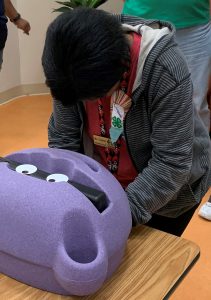
Looking for spots missed during hand washing by using black light and glow germ lotion that fluoresces under black light.
It’s hard to believe it is August already, with that we are getting ready to go back to school. Going back into the large group gathering requires a reminder to wash your hands often. You and your child will be around so many people and exposed to all kinds of germs. Regular hand washing helps you avoid getting sick and spreading your germs to others.
The CDC recommends that we wash our hands:
• Before, during, and after preparing food
• Before eating food
• Before and after caring for someone who is sick
• Before and after treating a cut or wound
• After using the toilet or after changing diapers or cleaning up a child who has used the toilet or been ill
• After blowing your nose, coughing, or sneezing,
• After touching an animal, animal/pet feed or treats, or animal waste
• After touching garbage
Take a moment to sit down and talk with your child about hand washing and the importance of washing their hands, especially when they get home from school.
Try this activity written by Tennessee 4-H to help youth see where they may be missing germs. This simple activity uses items you probably have in your kitchen. Begin by coating hands with a tablespoon of cooking oil. Next, sprinkle the oily hands with ground cinnamon. Have your child wash their hands using the steps outlined below. Once they have finished washing, have them smell their hands to see if they can still smell cinnamon. If they washed their hands correctly, the cinnamon smell and brown color should be gone from their hands.

A. Hands coated with cinnamon before hand washing
B. Quick wash like youth often do missing in between fingers, top of wrist, around nails
C. Thoroughly washed hands (all clean even between fingers)
Here are the steps we teach youth when they take our 4-H hand washing classes:
1. Wet your hands with clean, running water.
2. Apply soap and rub your hands together to make a lather. Make sure to get in between your fingers, under your nails, and on the top of your hands. Youth often miss these areas when we do a lesson on hand washing during 4-H events.
3. Scrub for at least 20 seconds—about the same amount of time needed to sing the Happy Birthday or ABC Song twice.
4. Finish by rinsing your hands with warm running water.
5. Dry hands with a clean towel or let air dry if a towel is not available.
6. Use the towel to turn off the water faucet to prevent re-contamination of your clean hands on a dirty faucet knob.
Have a fun and germ free day! 4-H is a family affair, offering many opportunities where both children and parents can participate in common interests. 4-H is one of the nation’s most diverse organizations and includes people from all economic, racial, social, political, and geographic categories. There are no barriers to participation by any young person. Participants are given the opportunity to engage in activities that hold their personal interest, while being guided by adult volunteers.
To find out more information about other 4-H programs like this or volunteer your time to work with youth, please contact your local UF IFAS County Extension Office.
by Allison Leo | Jul 26, 2019
Mindfulness is the act of creating awareness of your surroundings, emotions, and physical self in the present moment. It helps you connect to the world around you, while providing cognitive, social, and emotional benefits. Practicing mindfulness is not just for adults. Children can reap a multitude of benefits from learning and practicing mindfulness. Mindfulness equips children with the ability to adjust and deal with conflict encountered in their daily lives. It can also help children foster an optimistic outlook in life, react to stress in a healthy way, and develop a positive self-concept.
The practice of mindfulness is foreign to many adults, making it tricky to teach young children. The best thing to do is keep the message simple and model the behaviors you are teaching. Being taught by an adult that models mindful behaviors daily will assist kids in mastering the techniques. Below are a few mindfulness activities you can do at home as a family or in a group learning environment, such as a 4-H club meeting.
Zen Garden
A zen garden is a miniature landscape made with items such as moss,
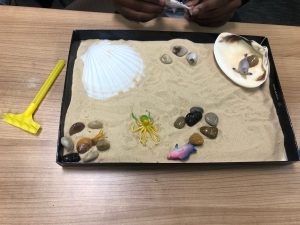
Zen garden created during Leon County 4-H Mindfulness Camp
rocks, and water features. Zen gardens are filled with sand and contain a small rake that you can use to create designs in the sand. The motion of raking the sand creates a sense of calmness. Zen gardens are often found on desks in the workplace because they are known for building focus and reducing stress. Building a zen garden is a fun and easy activity you can do with kids. Use a shoebox lid as the base and collect various stones and other items from outside to fill the box. Small rakes and sand can be purchased at a local craft store.
Mindful Safari
Taking a nature walk around your neighborhood or park is a simple way to exercise your mindfulness skills. Make it exciting by telling them you are going on a “mindfulness safari” and the goal is to see how many different birds, insects, and animals you can find on your journey. By searching for these items, you are fostering an awareness of the world around you. Similar to the mindful safari activity, you can take children on a “sound hunt.” This activity teaches kids to increase their awareness of the sounds in their environment. You can make the “sound hunt” more challenging by asking them to distinguish which sounds are close and which sounds are far.
Breathing
Breathing exercises are an important tool children can use to practice mindfulness. Learning how to control your breath and increase awareness of your breathing can help clear your mind in times of distress. You can practice breathing anywhere and no equipment is needed. Have kids sit on the floor or lie down. Instruct them to close their eye and take a huge breath in, filling up their lungs. Count to three and have them release. Breath activities can be completed sitting or lying down on your back. It is a good practice to have kids place their hands on their belly to feel the breath as it enters and leaves the body.
Mindful Eating
Mindful eating teaches children to understand when they are hungry and when they are full. It is important to eat without distractions, such as the television or your phone. Provide them with a variety of snack items. Ask them to look, listen, touch, smell, and taste the food in steps. They should pause after each step to reflect on what their senses are showing them about their food. First, look at what colors and shapes the item has. Next, listen to see if your food is making any sounds. Then, feel your food and describe the texture. Smell the item and define the scent. Finally, taste the food while paying attention to how the food feels and if the flavors change.
Yoga & Balancing
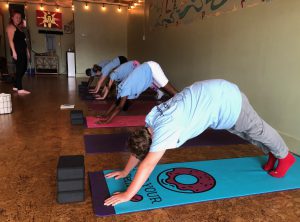
Practicing our “downward dog” pose during Leon County 4-H Mindfulness Camp.
Yoga is a great way to practice concentration, balance, and connection. Kids enjoy trying different yoga poses and stretches. A variety of free educational videos are available online that you can use to help guide you and your child through yoga sequences. Breathing techniques can be coupled with yoga and balancing. If kids do not have a yoga mat, a towel can be used. Practicing yoga shows kids that mindfulness does not always mean you are still or quiet.
Mindful Drawing
It is important to keep distractions to a minimum while drawing. This can be achieved by putting on relaxing music or simple sounds, such as rain falling or waves crashing. There are a variety of different drawing activities you can do with kids to practice mindfulness. If you have different sounds available, you can select a sound and instruct them to close their eyes and think of what that sound looks like to them. Then, have them open their eyes and draw what they heard. You can repeat this activity a few times with different sounds.
Body Appreciation
This activity works best in a group learning environment. Have kids break up into pairs and instruct them to take turns tracing each other on a large sheet of paper. Once everyone is finished, they will focus on their own bodies and write or draw what each body part does for them. For example, they can write “my head helps me think” or “my legs help me run.” Finally, they will write positive words on their body such as “I love to read.” This activity makes kids reflect on all the important ways their body helps them each day. It teaches them to appreciate and love their body.
Gratitude Journal
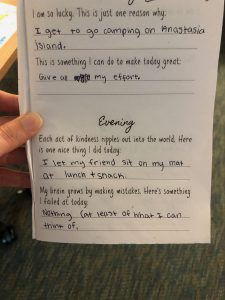
Gratitude Journals are a simple mindfulness activity kids can complete every day
When we feel and express gratitude to people in our lives, it creates loving connections, builds trust, and makes us feel joyful. Gratitude can be shown by giving someone a hug or telling them how much you appreciate them. Gratitude journals can easily be made at home or you can print off a pre-made template. This version is simple and is a great start for kids: https://researchparent.com/gratitude-journal-for-kids/
For more information on how your family can learn more healthy activities such as these mindful ones, find your local UF IFAS Extension Office and contact your 4-H Agent to explore what 4-H programs are offered in your area.
 Dates: January 10-11, 2025
Dates: January 10-11, 2025










